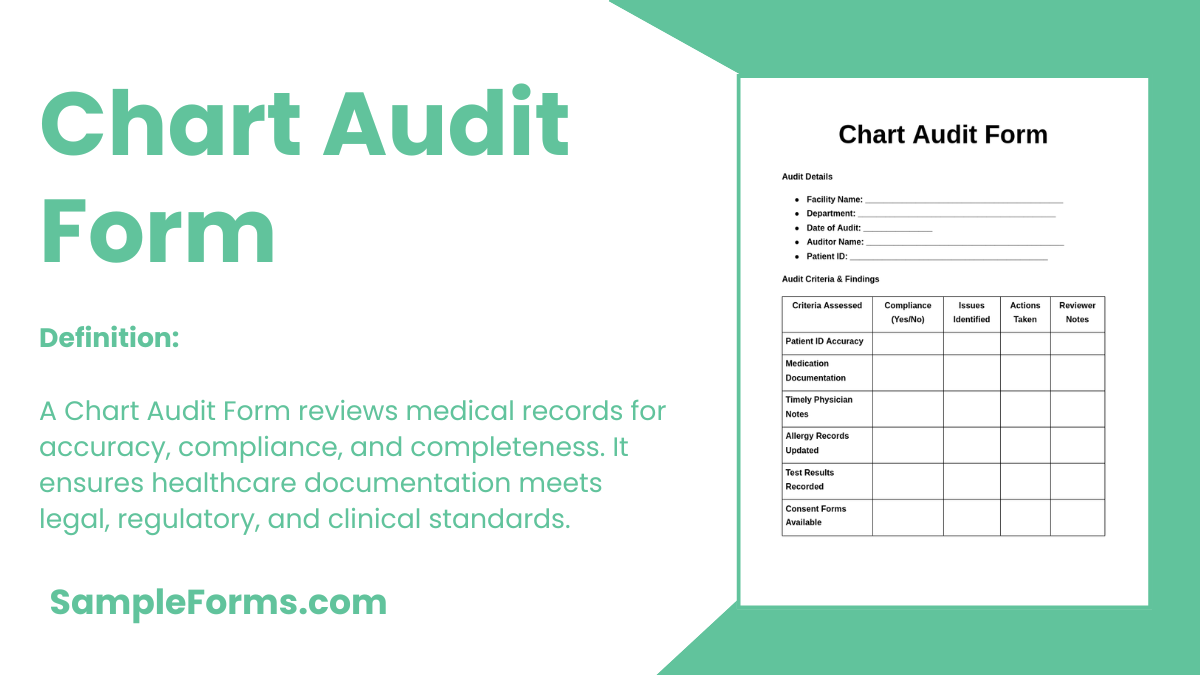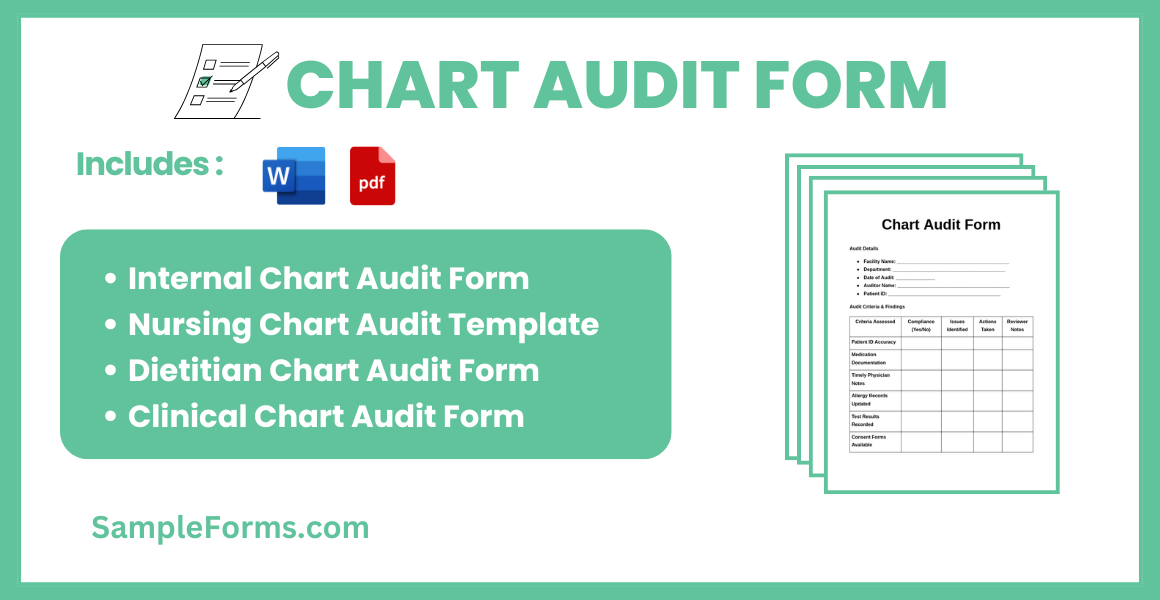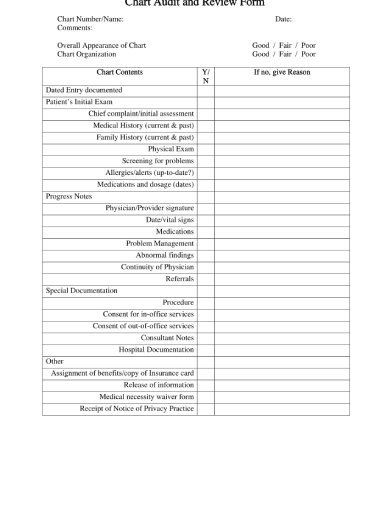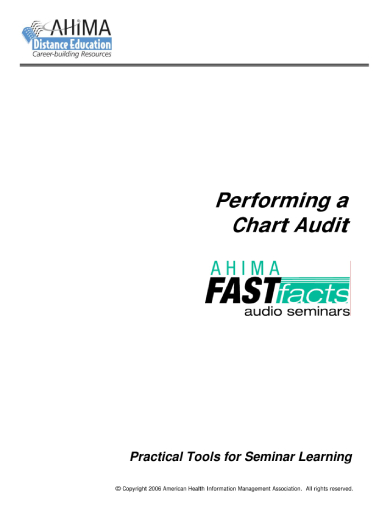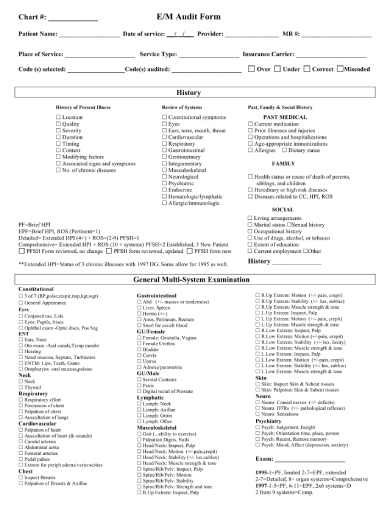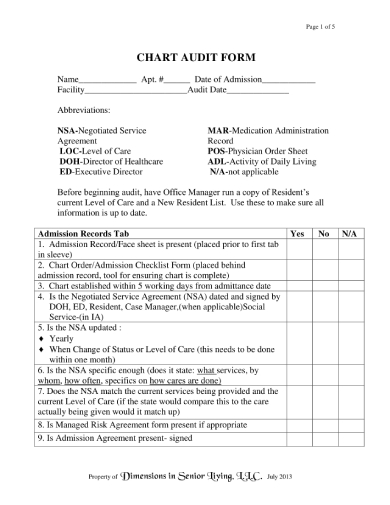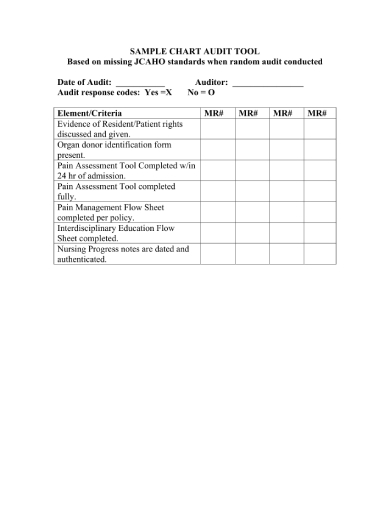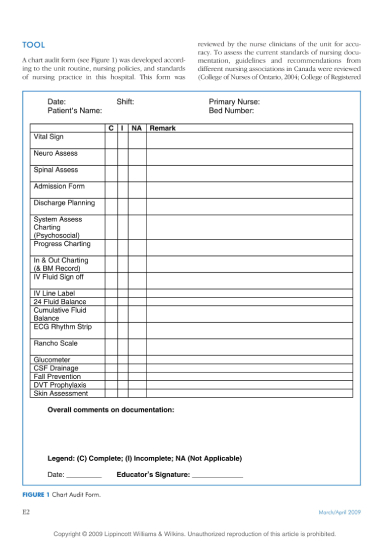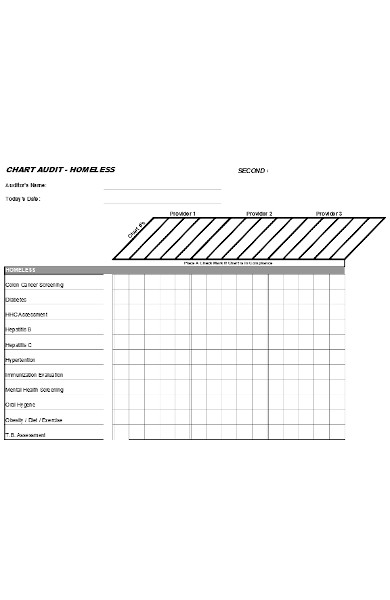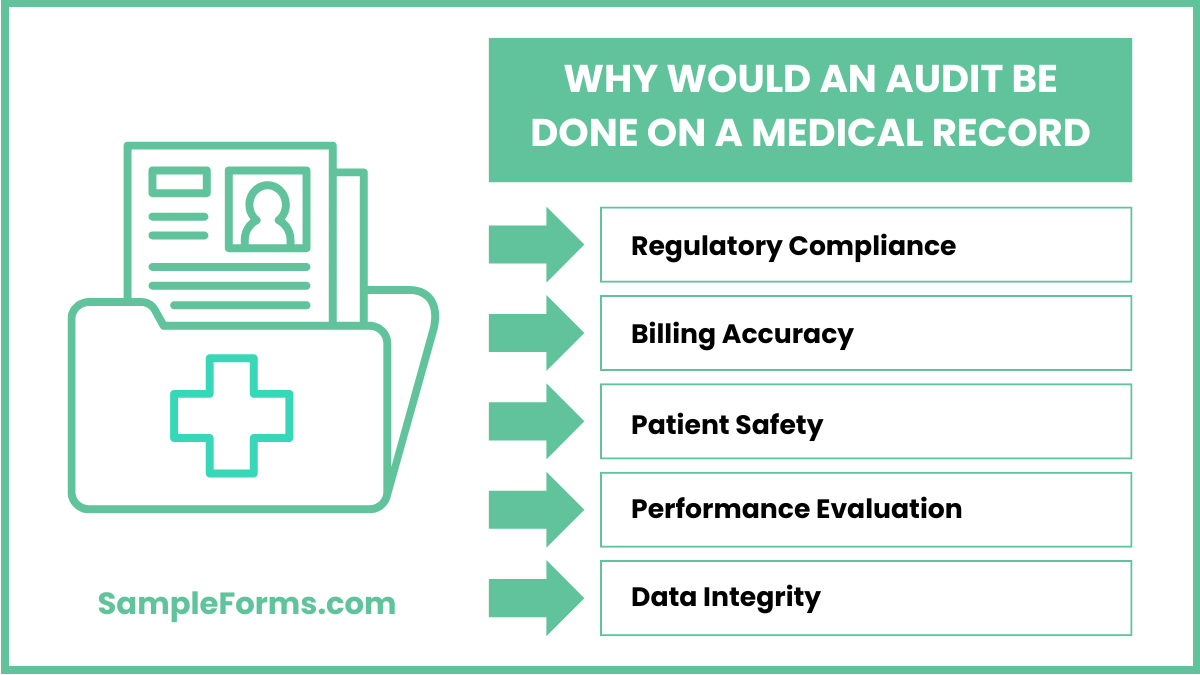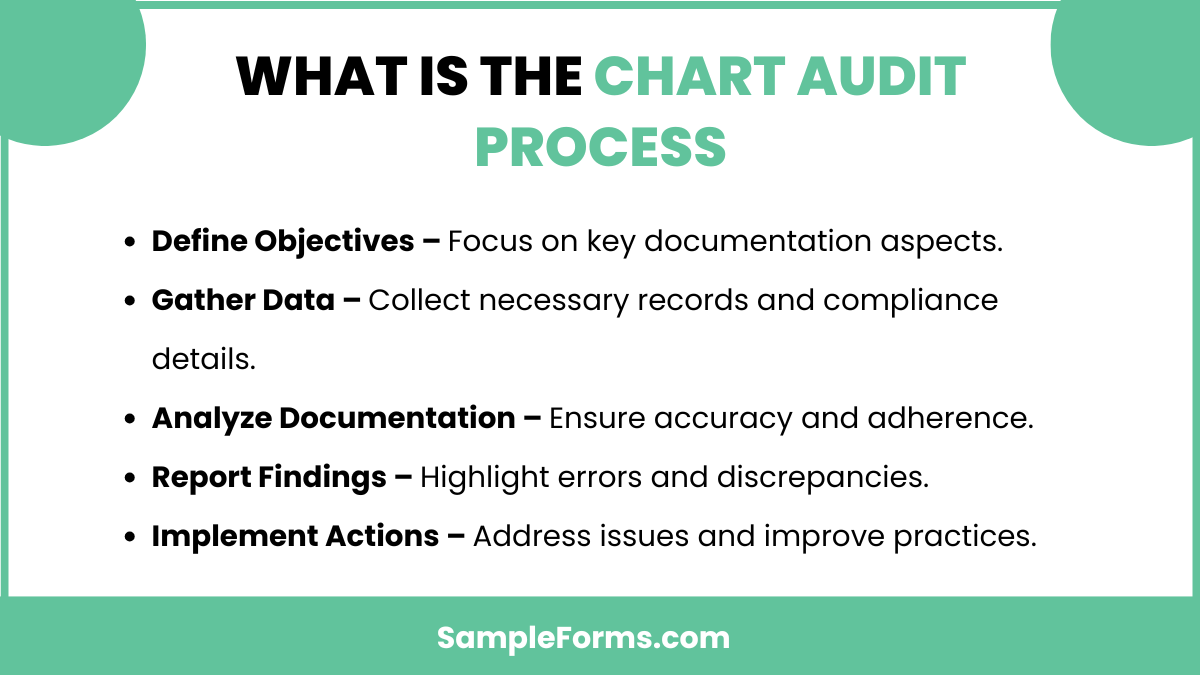A Chart Audit Form is a vital tool for reviewing and assessing documentation accuracy, compliance, and efficiency across industries like healthcare, finance, and business operations. It ensures that records meet regulatory requirements and organizational standards. Auditors use this structured form to identify discrepancies, track data accuracy, and recommend improvements. A well-designed Internal Audit Form helps in evaluating processes, enhancing quality control, and ensuring adherence to best practices. Whether for medical records, financial audits, or business evaluations, this guide provides in-depth insights, practical examples, and customizable templates to streamline your auditing process and improve record management.
Download Chart Audit Form Bundle
What is Chart Audit Form?
A Chart Audit Form is a structured document used to evaluate the accuracy, completeness, and compliance of records. It ensures that data aligns with regulatory and organizational standards. Industries such as healthcare, finance, and business rely on chart audits to maintain transparency and improve record-keeping efficiency. The form helps auditors systematically assess documentation, track errors, and implement corrective measures. By following a standardized audit process, businesses can enhance compliance, minimize risks, and improve overall operational quality. A Chart Audit Form is essential for maintaining data integrity and organizational accountability.
Chart Audit Format
Patient Information
- Full name and date of birth.
- Medical record number and appointment date.
- Healthcare provider’s name and department.
Documentation Review
- Accuracy and completeness of patient records.
- Timeliness of entries and compliance with regulations.
- Adherence to medical coding and billing guidelines.
Clinical Assessment
- Consistency between diagnosis and prescribed treatments.
- Appropriateness of lab tests and imaging studies.
- Verification of medication records and dosage accuracy.
Billing and Insurance Compliance
- Proper use of CPT and ICD-10 codes.
- Matching services rendered with insurance claims.
- Identification of potential billing discrepancies.
Audit Findings and Actions
- Summary of discrepancies or missing documentation.
- Recommendations for corrective actions.
- Follow-up plan for compliance review.
Signatures
- Auditor’s name, designation, and signature.
- Date of review and approval.
Internal Chart Audit Form
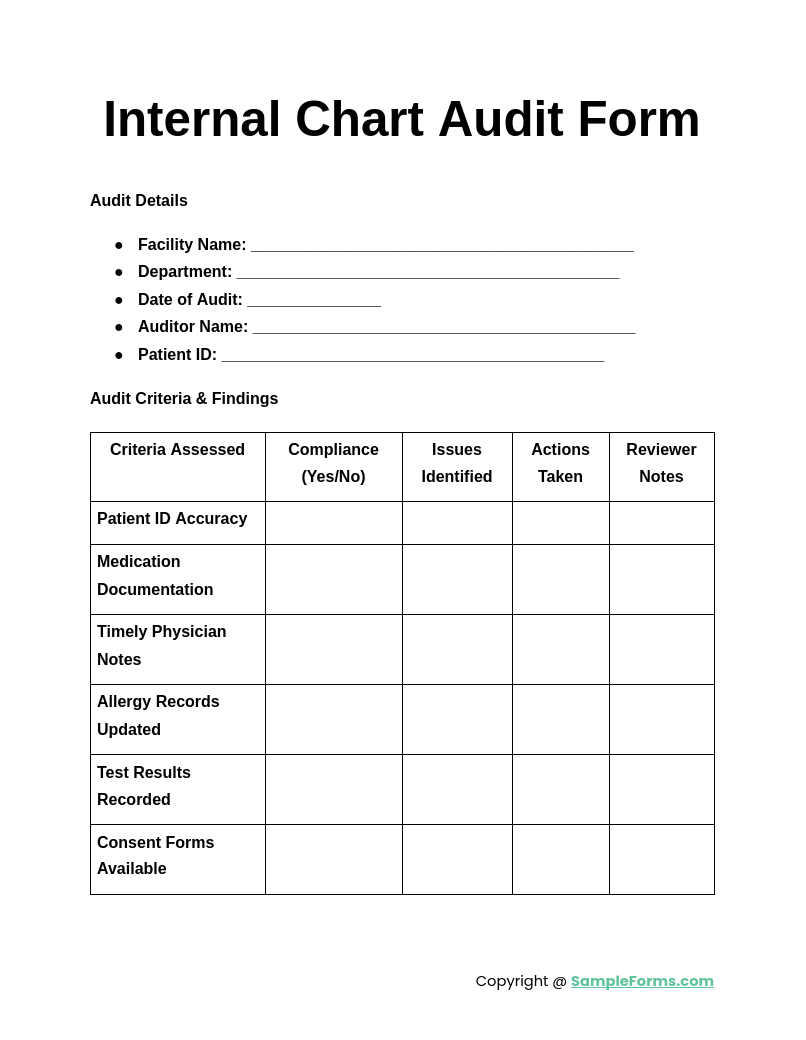
An Internal Chart Audit Form ensures compliance and accuracy in documentation. Similar to an Audit Report Form, it identifies discrepancies, verifies record integrity, and improves data consistency, helping organizations maintain quality standards and meet regulatory requirements.
Nursing Chart Audit Template
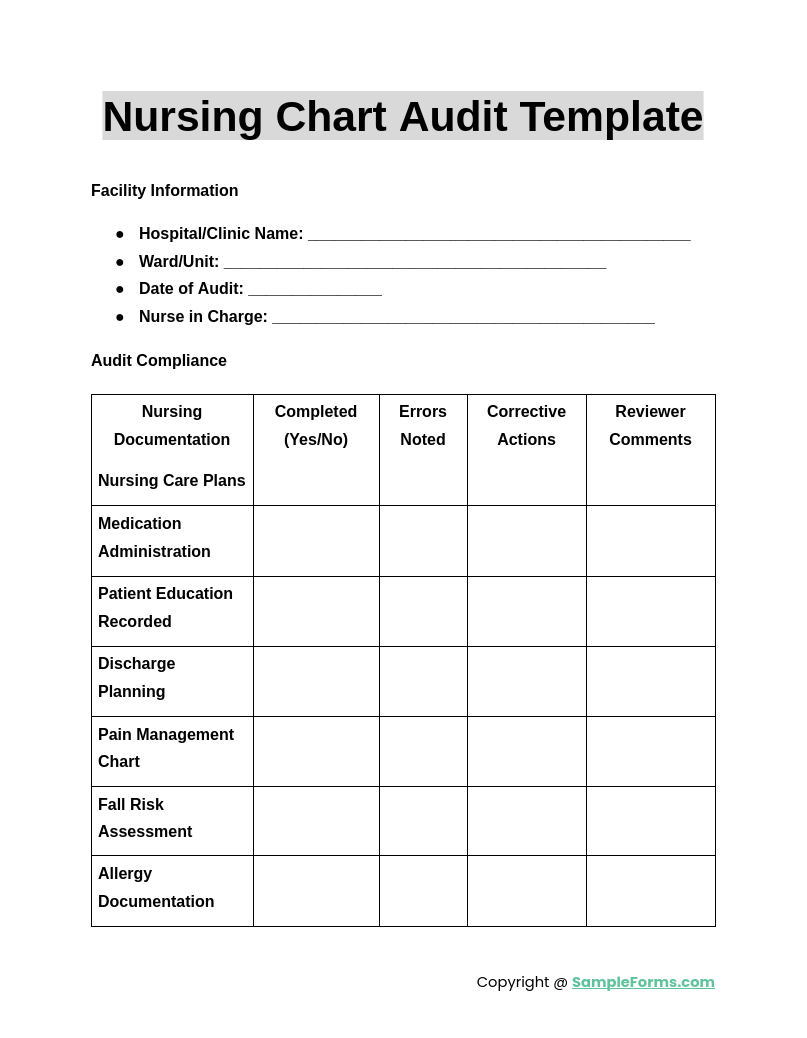
A Nursing Chart Audit Template evaluates patient records for completeness and compliance. Like an Audit Checklist Form, it ensures nursing documentation accuracy, medication tracking, and procedural adherence, enhancing healthcare quality and patient safety.
Dietitian Chart Audit Form
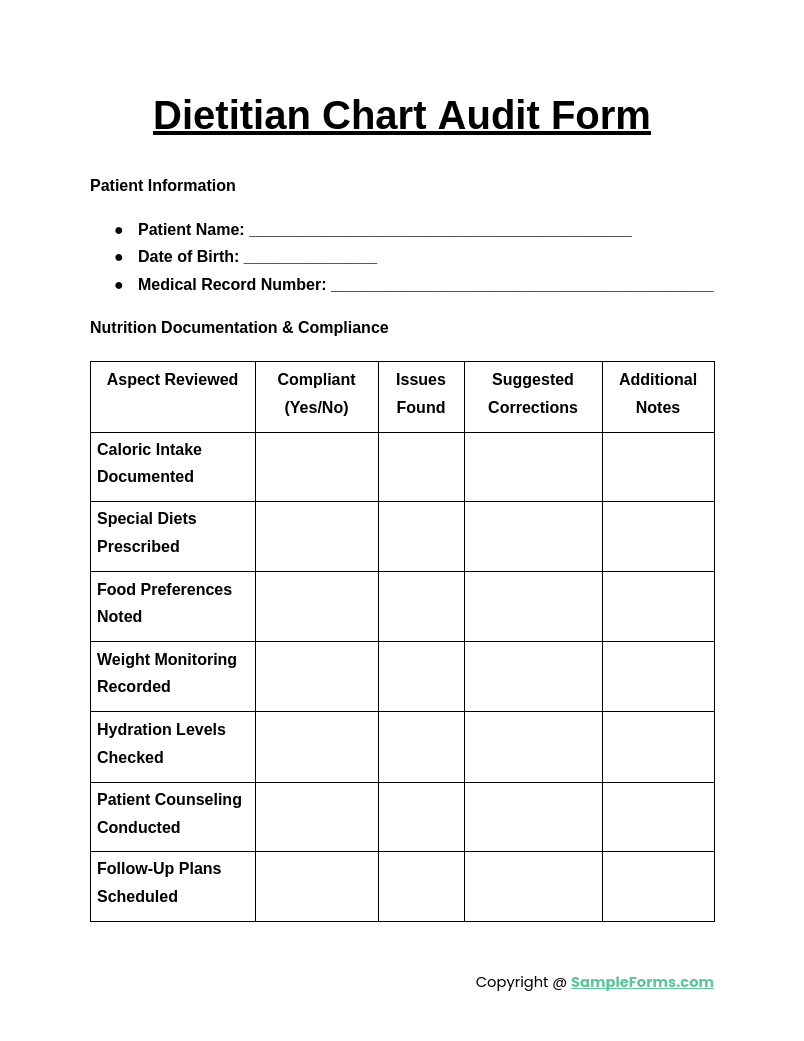
A Dietitian Chart Audit Form reviews nutritional care plans, meal recommendations, and patient progress. Similar to a Technical Audit Report, it ensures diet plans align with medical guidelines, improving nutritional care efficiency and patient health outcomes.
Clinical Chart Audit Form
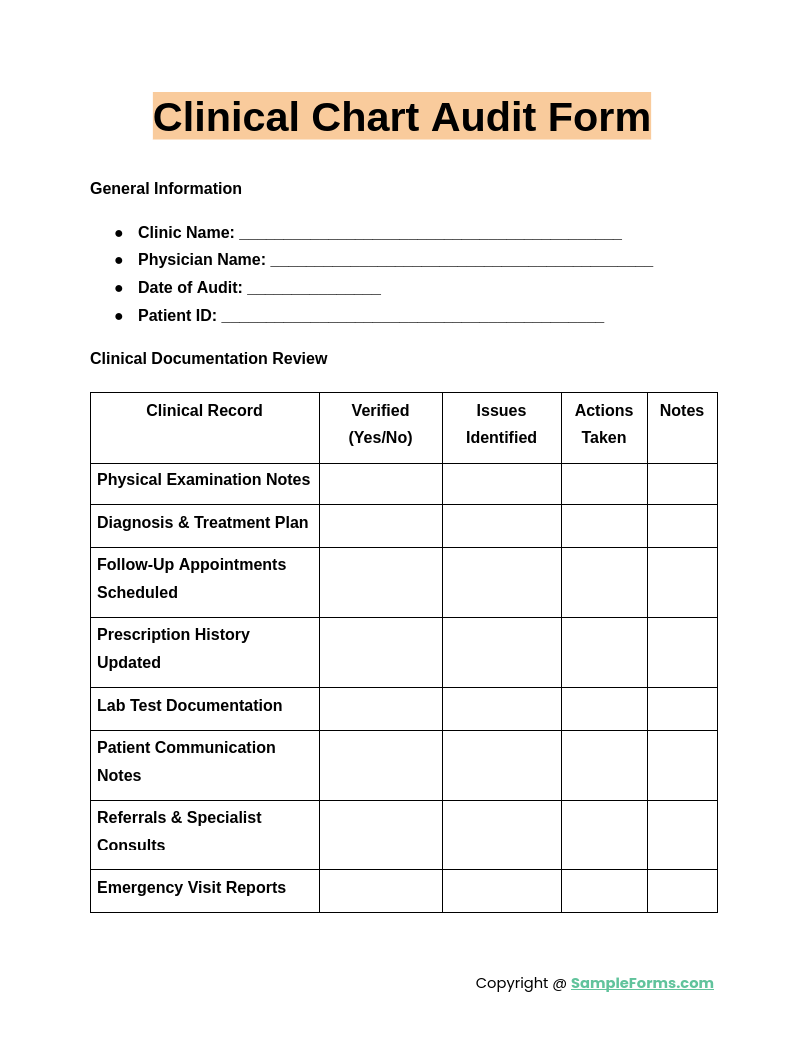
A Clinical Chart Audit Form assesses medical documentation accuracy and treatment compliance. Like a Safety Audit Form, it helps healthcare providers track diagnoses, procedures, and patient history, ensuring regulatory compliance and improved patient care quality.
Browse More Chart Audit Forms
1. Sample Chart Audit Form
2. Chart Audit Example
3. Medical Chart Audit Form
4. Chart Audit Form Sample
5. Sample Chart Audit Tool
6. Chart Audit Tool
7. Internal Chart Audit Form
Why would an audit be done on a medical record?
Medical record audits ensure accuracy, compliance, and quality in patient care. The main reasons include:
- Regulatory Compliance – Ensures records meet legal and industry standards, similar to an Audit Report for compliance verification.
- Billing Accuracy – Identifies incorrect coding or billing errors to prevent overpayments and fraud.
- Patient Safety – Confirms that treatment plans and medications are correctly documented for optimal healthcare outcomes.
- Performance Evaluation – Assesses healthcare provider documentation to improve care efficiency and workflow.
- Data Integrity – Verifies that patient records are complete, consistent, and securely maintained.
How do you become a chart auditor?
Becoming a chart auditor requires specialized training, attention to detail, and knowledge of compliance regulations. Key steps include:
- Obtain Relevant Education – Gain healthcare administration or coding certifications, similar to qualifications required for a Nursing Audit Form.
- Get Certified – Acquire credentials like CPC (Certified Professional Coder) or CHA (Certified Healthcare Auditor) to validate expertise.
- Develop Analytical Skills – Learn how to assess documentation, identify errors, and ensure compliance with industry standards.
- Gain Practical Experience – Work in healthcare auditing, billing, or compliance to strengthen hands-on auditing skills.
- Stay Updated – Keep track of regulatory changes and best practices to maintain accuracy in chart audits.
What is the basic purpose of an audit?
Audits help maintain compliance, assess efficiency, and improve operational performance. Their primary purposes include:
- Error Detection – Identifies discrepancies, similar to a Financial Audit Form, ensuring financial accuracy.
- Process Improvement – Analyzes procedures to enhance efficiency and minimize risks.
- Regulatory Adherence – Confirms compliance with legal, safety, and industry regulations.
- Accountability Verification – Ensures responsible record-keeping and adherence to policies.
- Quality Control – Enhances service delivery by maintaining high standards of performance.
What is the chart audit process?
The chart audit process involves systematic review and verification of records to ensure accuracy and compliance. Key steps include:
- Define Audit Objectives – Establish the purpose, like a Desk Audit Form, to focus on specific documentation aspects.
- Gather Data – Collect patient records, billing information, and compliance documents.
- Analyze Documentation – Check for completeness, accuracy, and adherence to regulations.
- Report Findings – Summarize errors, discrepancies, and areas for improvement.
- Implement Corrective Actions – Address identified issues and enhance documentation practices.
How to do audits?
Conducting an audit requires a structured approach to assess accuracy, efficiency, and compliance. Follow these steps:
- Plan the Audit – Define objectives and scope, similar to a Quality Audit Report Form, for targeted review.
- Collect Relevant Data – Gather necessary records, reports, and supporting documentation.
- Evaluate Findings – Analyze information for errors, inconsistencies, and regulatory compliance.
- Document Observations – Record findings, create an audit summary, and highlight corrective actions.
- Implement Improvements – Address issues, update procedures, and ensure compliance with regulations.
How many patients for an audit?
The sample size depends on the audit scope. For a Recruitment Flow Chart, HR audits typically review a percentage of total records for compliance.
What is the normal AQL level?
The Acceptable Quality Limit (AQL) varies by industry. A Financial Form audit ensures accuracy by setting acceptable thresholds for discrepancies.
What is the audit form?
An audit form is a structured document used for reviewing processes, similar to a Financial Assessment Form, ensuring compliance and accuracy in record-keeping.
What are the liabilities of an auditor?
Auditors are responsible for fair evaluations and can face legal consequences if fraud is overlooked, similar to obligations in a Financial Review Form.
What should you not do in an audit?
Avoid falsifying data, ignoring errors, or overlooking compliance requirements. Similar to a Financial Planning Form, accuracy and transparency are critical.
Who needs an audit and why?
Businesses, healthcare, and financial institutions require audits for compliance and accuracy, similar to reviewing a Financial Consent Form for legal approvals.
What is included in audit documentation?
Audit documentation includes reports, evidence, and evaluations, just like a Financial Information Release Form, ensuring accountability and compliance.
Can auditors make a lot of money?
Yes, experienced auditors earn well, especially in finance-related audits, where roles like Financial Waiver Form analysts are highly valued.
What do auditors look for?
Auditors assess compliance, accuracy, and fraud risks, similar to a Financial Statement Form verifying financial integrity.
Why audit is essential?
Audits ensure transparency, accuracy, and accountability, much like a Financial Assistance Form, which verifies eligibility and compliance.
A Chart Audit Form plays a crucial role in verifying documentation accuracy, maintaining compliance, and enhancing operational efficiency. It provides a structured way to assess records, identify errors, and implement necessary corrections. Whether used in healthcare, finance, or business audits, a well-prepared audit form ensures adherence to industry regulations and improves data management. Additionally, integrating a Financial Responsibility Form helps organizations maintain accountability and transparency in financial records. Utilize expert-designed templates and best practices to streamline your chart audit process and enhance record-keeping standards effectively.
Related Posts
FREE 12+ Standard Report Forms & Templates in PDF DOC
FREE 5+ Breakage Report Forms in PDF DOC
FREE 7+ Sample Construction Short Forms in PDF WORD
12+ Case Report Form Samples - PDF, DOC
FREE 10+ Supplier Evaluation Forms in DOC DOC
FREE 8+ Sample Client Satisfaction Questionnaire Forms in PDF ...
6+ Adverse Action Forms - Free Sample, Example, Format Download
FREE 9+ Sample Corrective Action Forms in PDF DOC
7+ Proposal Evaluation Form Samples - Free Sample, Example ...
FREE 15+ Case Report Forms in PDF DOC
FREE 14+ Trainee Evaluation Forms in Word PDF
FREE 9+ Sample Student Report Forms in PDF WORD
FREE 40+ HR Forms PDF
8+ Internal Audit Forms - DOC, PDF, XLS
FREE 8+ Sample Audit Report Forms in PDF WORD
